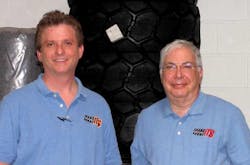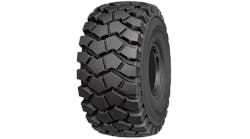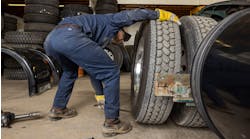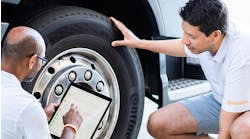With the excitement surrounding environmentally friendly passenger and medium truck tires, it’s easy to forget that low rolling resistance and energy efficiency have become sought-after qualities in other products, such as industrial tires.
One dealership, Bensenville, Ill.-based Industrial Tire Solutions (ITS), has carved out a profitable niche selling energy efficient forklift tires to clients in the Chicago area.
Warehouses and material handling firms are going green, according to Charlie Cohen, who owns ITS along with partner Mike Pollini. Over the last several years, there has been a concentrated movement in the material handling industry to switch over to more energy-efficient forklifts, he explains.
Electric — or in material handling industry parlance, AC — trucks “are starting to dominate the market,” putting older, gas-powered machines out to pasture.
AC trucks deliver longer runtimes and faster acceleration, says Cohen, who formed ITS with Pollini four years ago. (Combined, the men boast more than 60 years of experience selling industrial tires, having worked for other Chicago-area dealerships before joining forces.)Another bonus: new AC lifts contain fewer moving parts than gas-powered units. For instance, Toyota Material Handling U.S.A. Inc.’s new 8-series line, introduced last month, contains no motor brushes or springs.
Outfitting AC trucks with low rolling resistance tires “is big-time business and it translates into big savings, especially for big box retailers and large distribution centers.”
[PAGEBREAK]Hanging tough
“The Windy City’s” industrial tire market has not been immune to the ravages of the recession, says Cohen. “Chicago has lost a lot of meat-and-potato factory jobs. We’ve lost some accounts. But we’ve weathered the storm well.”
Keeping up with changes in tire design and construction is a full-time job, he says. Stronger, more durable construction has become the norm with forklift tires. “There are some fiberglass and Kevlar-reinforced tires that offer more value.” (ITS sells several industrial tire brands, including Maine, Superior, Thombert, Vulko Tread, and others.)
Even non-marking industrial tires have become more robust and last much longer than their predecessors. “Right now, non-marking tires last up to 90% of (the average life of a) regular black tire. In the old days, you were maybe talking 60% to 70%.”
Silica compounding is key to this increased longevity, he notes. “It makes for a longer lasting tire. We’re also seeing big strides in the compounding of solid pneumatic tires.”
In addition, Cohen is seeing more industrial tires from China, Sri Lanka and other Asian countries. Due to tight budgets, he and Pollini’s customers are scrutinizing the service hours they’re squeezing out of their tires like never before.
“The market is definitely in a price-driven mode because of the recession.” ■
[PAGEBREAK]Radialization is on the rise
There are many trends taking place in the lawn and garden and recreational trailer tire segments.
One of the most important is radialization, according to Greenball Corp. “A lot of original equipment manufacturers are pulling away from bias,” says Tim Landis, vice president, replacement/aftermarket, Greenball. “You get more mileage out of a radial,” as well as a smoother ride — important considerations when hauling livestock or expensive recreational vehicles like boats and motorcycles.
Greenball’s trailer tire business is up considerably, says Landis. “Right now everything that’s coming in is going out.”



